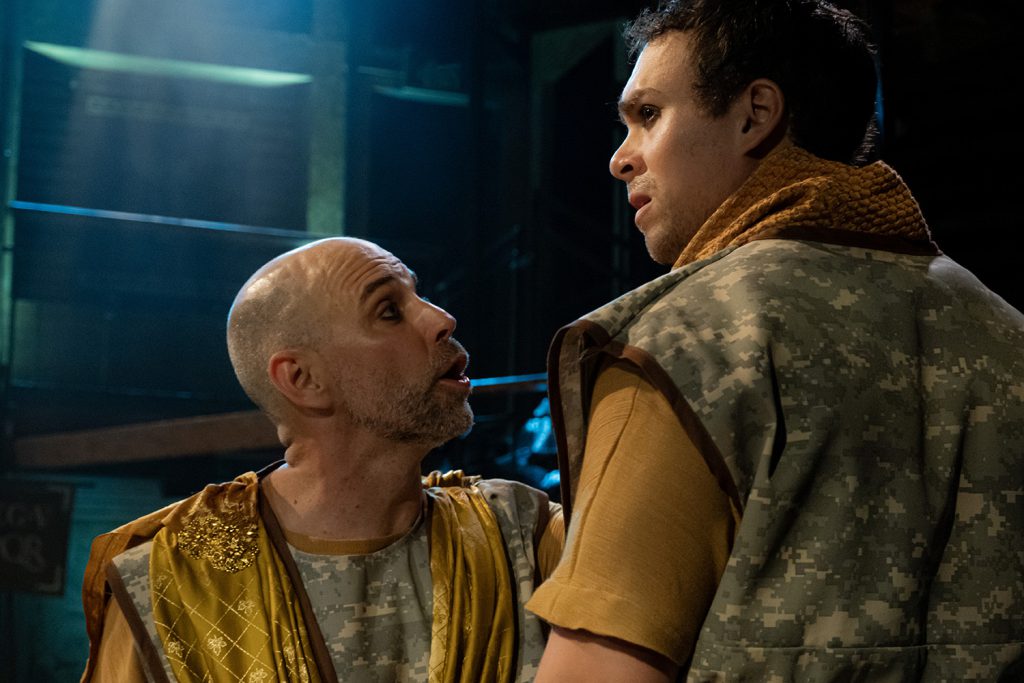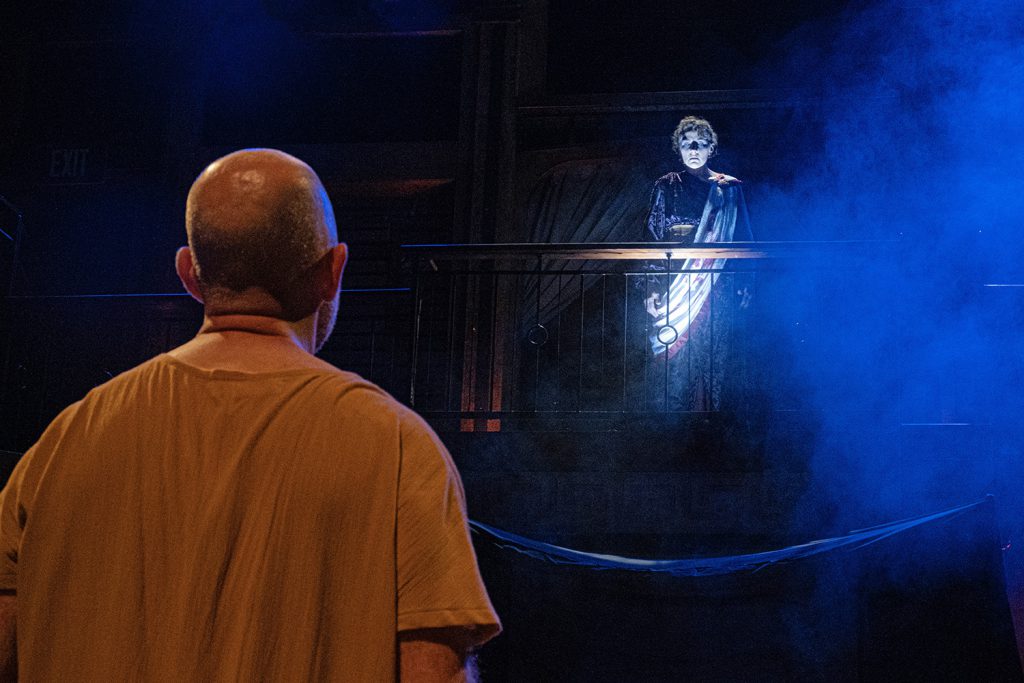
By Eric Marchese | Special to the NB Indy
Was Julius Caesar ambitious?
Ambition is an elusive quality that pushes those gripped by it into deeds often incomprehensible to most of us. Shakespeare knew it well, and explored it through multiple characters – notably Lady MacBeth, Richard III, and Goneril and Regan, who lunged for wealth and power possessed by their father, King Lear.
The Bard of Avon’s 1599 historical drama “The Tragedy of Julius Caesar” examines the personality traits and possible motives that drove the Roman general and politician, having us wondering whether he craved the highest pinnacle of power or, on the flip side, wanted only what was best for Rome and its populace.
At its intimate, 137-seat outdoor venue at U.C. Irvine, a miniature replica of Shakespeare’s Globe Theatre, New Swan Shakespeare Festival produces a “Julius Caesar” that pares down and tightens the script, clarifying a storyline and themes that depict a gripping dynamic.
On one end is Caesar, poised to become an omnipotent emperor of Rome; at the other, desperate to counterbalance him, are a handful of senators terrified his power and popularity will replace the Republic with a monarchy.
Director Andrew Borba’s staging then takes us a step further, depicting Caesar, Mark Antony, Cassius, Metellus Cimber, Lucius and Pindarus as women.

The play’s eternal relevance is turbocharged by Borba and his cast’s morphing of figures like Caesar into personalities who’d seemingly be at home in today’s world (read: the 2016 presidential election).
Illnesses within the cast prompted Chris Hathaway to fill the title role in place of Sonya Cooke on opening night plus some shuffling among supporting players.
For now, with the vigorous, assertive persona Hathaway brings, this is a compelling “Caesar” that drives home a stark truth: political adversaries can claim the high ground, each insisting moral superiority over the other, with none necessarily being in the wrong.
At New Swan, one faction involves Caesar (Hathaway), who just prior to the play’s start has thrice been offered the crown and title of Emperor by Antony, acting on behalf of the public – and, publicly, repeatedly turned it down.
Lining up to prevent what they view as a dangerous, potentially disabling political rulership model are some of Rome’s most influential, dominant senators: Brutus (Sean Spann), Cassius (Hope Andrejack), Casca (Giovanni Corzo) and Metellus (Sarajane Bradford).

A cabal led by these four comes to the conclusion that Caesar is on a blazing trajectory that can’t be halted or even slowed. So how do you derail someone so beloved, and held in such high esteem, by the public?
They reason that assassination is their only recourse.
Agreeing that such drastic violence can’t be concealed and that they must own the motive for their murderous deed, they trumpet the elimination of Caesar as an act of patriotism and a victory for the freedoms and liberty of all Romans.
The fierce storm on the eve of what will become a bloody Ides of March terrifies Corzo’s Casca. We share that visceral feeling of dread, thanks to lighting designer Karyn D. Lawrence’s crackling lightning and the crashing thunder and spectral whispers created by sound designer Costandina J. Daros.

Though stylized, Borba’s depiction of Caesar’s bloody murder is ever gripping. Lawrence bathes the scene in blood-red hues, overlaid with flashing strobes, while Daros floods our ears with pounding heartbeats.
In the aftermath, Brutus convinces Romans of the purity of his motives, and all goes according to expectations – until Antony (Meg Evans) addresses the public.
She realizes her eulogy must thread the needle, praising Caesar without damning those who slew him. Evans’s voice shaking with emotion, her impassioned Antony brings herself to tears over the loss of Caesar. And, via the script’s brilliance, Antony proves a master orator, cannily dispelling the argument Brutus and friends have pushed.
Before long, the vitriol that had united the cabal of senators against Caesar is what divides them, with Cassius and Brutus, each believing they’re in the right, at each other’s throats.
Andrejack’s voice chokes with anger as Cassius vents her choleric anger at Brutus. Spann’s Brutus accuses lifelong friend Cassius of having accepted bribes, moving her from disingenuous to downright dishonest.

Our utter fascination with this tale is that every character genuinely believes they’re on the right side of the issues and of history. And as Shakespeare doesn’t wish to sit in judgment of what their moral makeup has driven them to, we viewers aren’t apt to do so, either – not after absorbing all that “Julius Caesar” has to offer.
At New Swan, the fulcrum is Hathaway’s Caesar, her rock-solid voice pronouncing each utterance, driving home how stock-sure she is of herself. Much more so than simply driven by hubris or an inflated ego, this Caesar is imbued with stubborn strength. Her faith in herself absolute, she’s convinced she’s invincible and that no harm can befall her.
With her every New Swan role, Andrejack reveals more of her wide-ranging skills. Her Cassius embodies genuine conviction that every fiber of her being is consumed by the welfare of all of Rome, and she sputters with anger as events cause her ideals to dissolve.

At play’s end, Antony labels Brutus “the noblest Roman of all,” and indeed, Spann shows us his inner torment as the only figure in the story who loves and is loyal to Caesar yet also loves his country – and is torn as to whether to follow Caesar or accede to Cassius’s plan.
Bradford’s Metellus seems the most unruffled assassin, unswervingly staying the course without being sucked into the roiling maelstrom of acrimony. Evan Lugo’s vengeance-driven Octavius, Caesar’s adopted son, quakes with violent anger – a contrast with Evans’s Antony, who is able to channel her fury toward the assassins.
Laden with basic – but not base – emotions, “Julius Caesar” brims with Shakespeare’s incisive understanding of human nature. New Swan’s magnificent, tightly focused staging brings these attributes to the fore for audiences to dissect, debate and enjoy.
New Swan Shakespeare Festival, Gateway Commons/Gateway Plaza, 4004 Mesa Road, Irvine (University of California, Irvine). Through Sept. 2 (running in repertory with “As You Like It”). Running time (including intermission): Two hours. Tickets: $23-$90. Ticket purchase/information: 949-854-4646, www.newswanshakespeare.com.
